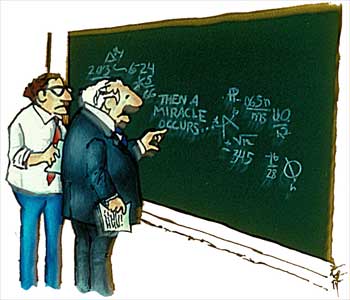Aaron: TAG stands for the transcendental argument for Godʼs existence. Van Til and Bahnsen argue that science, logic, and morality all presuppose the existence of the Christian (read Calvinist) God. Amazingly enough, their attacks on science and logic seem to stem from the radical skepticism of David Hume. Hume argues that there is no rational basis for induction…in other words just because the sun comes up today doesnʼt mean that it necessarily will come up tomorrow. Still, science presupposes that induction works thus they presuppose the existence of God. In a nutshell, proponents of TAG argue that everybody, by their actions, demonstrate that they know that God exists. They presuppose that Christianity is true and the Bible is infallible. Thus, they maintain that all knowledge is contrary to scripture must be wrong. So, they hold that their worldview is internally consistant. At the same time, they argue that inconsistancies can be found in every other worldview.

Edward: Naturalists point out the opposite, that the regularity of the universe appears to be natural and hence does not require Godʼs existence.
And of course, the history of modern day science, though it “began” among mono-theists, is now a discipline all on itʼs own, practiced by people of all faiths and non-faiths. So there is no proof that science requires monotheism. (The Greeks were reasoning their way toward new inventions and conducted some of the earliest scientific experiments long before Christian mono-theism arose, and of course, Christian mono-theism also was originally so supernaturally based that it also served to thwart many scientific investigations in favor of demonic and angelic explanations of the cosmosʼ behavior.)
And lastly Iʼve just read about the discovery of Omega numbers. Unpredictable numbers, and their discovery has thrown a further wrench in the belief that mathematics and/or logic are somehow “proven” disciplines. Itʼs always been a matter of discovering things, like biologists discover new species. Or like discovering that the sun rises again and again in very similar fashion.
All in all, the TAG argument is neither an argument nor “proof” of anything, but an interpretive outlook. I believe, having read Rushdooneyʼs The One And The Many, that Rushdooney thought even the Trinity could be “proved” if you began with the “right presuppositions.” Itʼs the presuppositions and interpretations that differ. There is no “proof” in presuppositional apologetics.
Or as Timothy Leary once put it, “I donʼt believe that the truth will set you free, because we all have such a tremendous ability to rationalize the truth.”


No comments:
Post a Comment